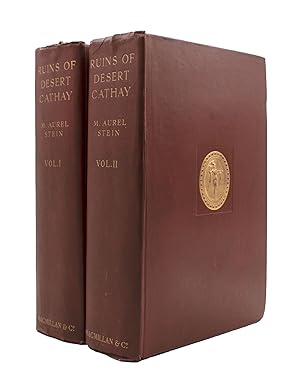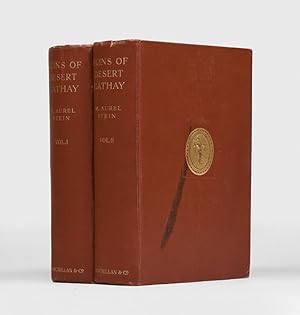Ruins Desert Cathay Personal Narrative by Stein Marc Aurel Sir (3 results)
FeedbackSearch filters
Product Type
- All Product Types
- Books (3)
- Magazines & Periodicals (No further results match this refinement)
- Comics (No further results match this refinement)
- Sheet Music (No further results match this refinement)
- Art, Prints & Posters (No further results match this refinement)
- Photographs (No further results match this refinement)
- Maps (No further results match this refinement)
- Manuscripts & Paper Collectibles (No further results match this refinement)
Condition Learn more
- New (No further results match this refinement)
- As New, Fine or Near Fine (No further results match this refinement)
- Very Good or Good (No further results match this refinement)
- Fair or Poor (No further results match this refinement)
- As Described (3)
Binding
- All Bindings
- Hardcover (1)
- Softcover (No further results match this refinement)
Collectible Attributes
- First Edition (3)
- Signed (No further results match this refinement)
- Dust Jacket (No further results match this refinement)
- Seller-Supplied Images (3)
- Not Print on Demand (3)
Language (1)
Price
- Any Price
- Under £ 20 (No further results match this refinement)
- £ 20 to £ 35 (No further results match this refinement)
- Over £ 35
Free Shipping
Seller Location
Seller Rating
-
Ruins of Desert Cathay. Personal Narrative of Explorations in Central Asia and Westernmost China
Published by MacMillan and Co., Limited, London, 1912
Seller: James Cummins Bookseller, ABAA, New York, NY, U.S.A.
First Edition
£ 1,209.15
Convert currency£ 33.02 shipping from U.S.A. to United KingdomQuantity: 1 available
Add to basketFirst edition. First edition. 3 folding colored maps, 8 colored plates (each with a printed tissue guard), 339 photographic illustrations on 212 plates (6 folding panoramas). xxxviii, 546, [2]; xxii, 518, [2] pp. 2 vols. 8vo. The classic account of Stein's 1906-08 second expedition to Chinese Central Asia, incuding his discovery of the "Caves of the Thousand Buddhas" near Dunhuang. Ghani p.694; Yakushi (1994) S716 Publisher's russet cloth, upper cover with embossed design in gilt, minor darkening to spines and very light wear. Custom slipcase. Provenance: Edward W. Bodman (bookplate) 3 folding colored maps, 8 colored plates (each with a printed tissue guard), 339 photographic illustrations on 212 plates (6 folding panoramas). xxxviii, 546, [2]; xxii, 518, [2] pp. 2 vols. 8vo.
-
Ruins of desert Cathay: personal narrative of explorations in central Asia and westernmost China
Published by Macmillan & Co, London, 1912
Seller: Rulon-Miller Books (ABAA / ILAB), St. Paul, MN, U.S.A.
First Edition
£ 1,039.11
Convert currency£ 54.29 shipping from U.S.A. to United KingdomQuantity: 1 available
Add to basketFirst edition, 2 volumes, thick 8vo, portrait of the author, 8 color plates, 6 folding panoramas, 3 large folding maps, and 333 illus. on 219 plates; original terra cotta cloth, covers decorated in gilt, spines lettered in gilt; lightly rubbed, one small crack at the top of the spine of volume I; all else very good and sound. The large folding map at the back of volume II is loose (but present) and is laid down and with old repairs at the folds, and the final leaf of ads has a small hole where the rebacking of the maps adhered.
-
Ruins of Desert Cathay. Personal Narrative of Explorations in Central Asia and Westernmost China.
Published by London: Macmillan and Co., Limited, 1912, 1912
Seller: Peter Harrington. ABA/ ILAB., London, United Kingdom
First Edition
First edition, first impression, of this handsomely produced account of Stein's second expedition to Central Asia between 1906 and 1908, where he acquired a copy of the Tang Dynasty Chinese version of the Diamond Sutra. Found in Dunhuang (Tunhuang), it is widely recognized as the first complete printed book, dating back to 868CE. The find furthered the understanding of trade routes along the Silk Road. "The city of Dunhuang in north-west China, is situated at a point of vital strategic and logistic importance, on a crossroads of two major trade routes within the Silk Road network. The remarkable Mogao Caves, a collection of nearly 500 caves to the south of the city, contain the largest depository of historic documents along the Silk Roads and bear witness to the cultural, religious, social, and commercial activity that took place in Dunhuang across the first millennium" (UNESCO). "Stein's great achievement. was to establish the existence of a hitherto lost civilization along the Silk Route in Chinese central Asia. [He] was the first archaeologist to discover evidence of the spread of the Graeco-Buddhist culture of north-west India across Chinese Turkestan and into China itself. Stein's best-known find came at Tunhuang in 1907, during his second expedition (financed by the government of India and the British Museum), when he reached the Caves of the Thousand Buddhas. Discovering thousands of manuscripts, paintings, and textiles walled up in a room in one of the caves, he bribed the custodian to part with many of them. Experts later found them to date from the fifth to tenth centuries AD. They included votive banners, Buddhist texts, and early secular works in a wide variety of scripts and languages, and a large, block-printed roll, dating from AD 868, which proved to be the world's oldest known printed book, a copy of the popular Buddhist work The Diamond Sutra" (ODNB). Howgego IV, S 65; Yakushi S 331; "Dunhuang", UNESCO, accessible online. 2 vols, octavo. Numerous plates, maps and plans including 8 coloured plates and 6 folding uncoloured panoramas, 3 folding coloured lithographic maps. Original reddish brown cloth, title gilt to spines, front cover with embossed gilt roundel showing Athena with arm outstretched brandishing the aegis incorporating the gorgoneion (Stein's personal emblem), top edge gilt, others uncut. Extremities rubbed with short tears to spine ends, corners slightly bumped, stain to front cover of vol. 2, scattered foxing, plates fresh; overall a very good copy.




